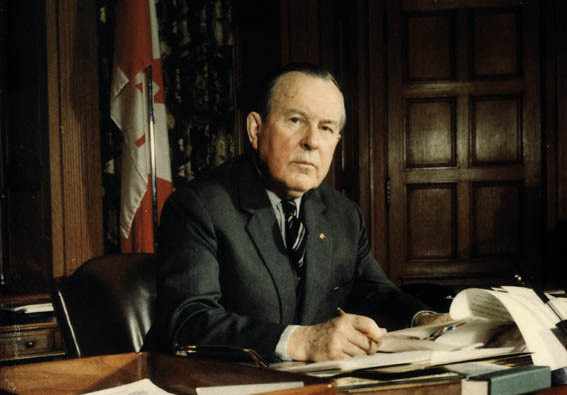April 22, 2013
My great grand father’s legacy
By Mieka Buckley-Pearson

Thank you for hosting this event as well as inviting me to speak on behalf of the family. Malheureusement il est assez difficile de nous rassemblons tous, mais c’est avec grand plaisir que je prends la parole au nom de la famille.
I’ve been thinking about the legacy of the Pearson government and what it means to me, not only as a relative and great-grand-daughter, but also as a young adult, discerning my concerns and desires for my society and country, as well as what world I want to shape for future generations.
I never had the opportunity to meet my great-grand-father as he died 17 years before I was born. The closest I came to meeting him was as an infant, clambering on top of his statue as it was officially unveiled on Parliament Hill.
It would be sensible to assume that we may have found it difficult to relate if we ever had the opportunity to meet. He served in the First World War; I was born a few months before the fall of the Berlin Wall; he witnessed the invention of the radio, airplane and car; I’ve witnessed the invention of the iPad mini, which I’m sure he would find to be a completely perplexing oddity.
But that assumption would be wrong. Although political, economic, and social circumstances have changed, the foundational values and beliefs that informed and shaped my great-grand-father’s work and life are shared by me, and shared by Canada.
To me, my great-grand-father’s legacy is rooted in his remarkable ability to identify the foundations of both Canadian and global society, and translate them into effective and widely supported policies. These foundations that he built from are not partisan, they are Canadian. They are values, such as openness, tolerance, equality and innovation; of national unity, of a “Canada greater than the sum of its parts.”
These values form the base, the support structure of Canada today as they did then; they have not become outdated or irrelevant, but instead have grown and entrenched themselves across the nation. Changes in government and public policy have not and cannot erode this base.
It is because Pearson, along with his colleagues, peers and successors, built Canadian policies and institutions from these foundations that many of their accomplishments are still central to our society.
I was first confronted with this realization last year when I was writing my thesis. I studied the relationship between good governance and aid effectiveness in Sub-Saharan Africa from 1960 until 2010. It was a daunting task, and there was nowhere else to begin my research but at the beginning… With the 1969 Commission on International Development, otherwise known as the Pearson Commission.
In their report entitled Partners in Development, the Pearson Commission made recommendations for the future operations of development assistance and the relationship between the “haves and have-nots.”
In reviewing the report, I was struck by its central tenets, which nearly 50 years later remain central to the international community’s development efforts. The report emphasized the widening gap between developed and developing countries, as well as the implications for security, health, prosperity and governance, as a central issue of the period. The development of a world, “more and more starkly divided between the haves and have-nots, the privileged and the less privileged,” remains one of the central issues of our time, and will for future generations to come.
For a domestic example, I would like to turn to a speech he made at the Canadian Institute of Public Affairs summer conference in August 1949, entitled “The Implications of a Free Society.” In the speech he highlights the essential elements of a free, prosperous and united Canada, namely: tolerance and the avoidance of extreme policies, or what he liked to call “walking in the middle of the road.”
He asserted: “the central quality of this approach is the stress which it always lays on human values, the integrity and worth of the individual in society… The middle way, unlike extremism in political doctrine, has positive faith in the good will and common sense of most people in most circumstances. It relies on their intelligence, their will to cooperate, and their sense of justice. From its practitioners, it requires determination and patience, tolerance and restraint, the discipline of the mind rather than the jackboot, and the underlying belief that human problems, vast and complicated though they may be, are capable of solution.”
It is not enough to simply “stand firm, but motionless, in the middle of the road.” We must adapt, modernize, and progress, with our strong foundations, future generations and the big picture in mind.
It is particularly fitting that today’s event coincides with the annual celebration of Earth Day, where Canadians and global citizens are encouraged to consider the effects of climate change on not only their personal way of life, but the livelihoods of individuals and societies around the globe. What an excellent example of Pearsonian, big picture thought. Though the issue is climate change and not the Cold War, it requires middle of the road, inclusive and not divisive, Canadian solutions.
It is because my great-grand-father was successful in this regard, creating national policies that represented a careful and considered balancing of political and economic forces, that the legacy of his government remains entrenched in Canadian society today. It is my hope that we continue to build from that base, and walk in step with Canadian values.
Recent graduate, University of British Columbia and great grand daughter of Lester B. Pearson.



